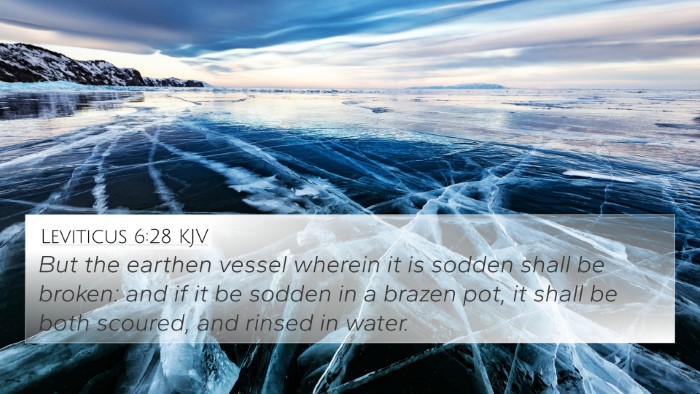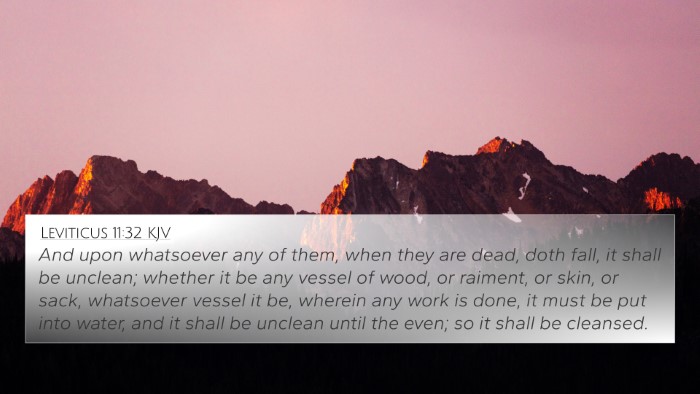Understanding Leviticus 15:12
Leviticus 15:12 states: "And the earthen vessel which hath the fluid that hath come from him shall be broken; and every wooden vessel shall be rinsed in water." This verse falls within the broader context of laws pertaining to bodily discharges and ritual purity. The significance of this verse reveals both physical and spiritual dimensions of cleanliness in ancient Israelite culture.
Summary of Meaning
This verse emphasizes the importance of purification. According to Matthew Henry, the broken earthen vessel symbolizes the heart's need for renewal after sin or impurity has entered. It demonstrates the serious nature of maintaining ritual cleanliness, reflecting the character of God who is holy.
Albert Barnes adds insight by noting that the act of breaking an earthen vessel represents the complete and irrevocable nature of cleansing required for anything that has been made unclean. The rinsing of wooden items underscores the Jewish understanding that different materials require different methods of purification.
Adam Clarke indicates that these purification laws not only serve a hygienic purpose but also remind the Israelites of their covenant relationship with God. Cleansing rituals highlight their need for continual atonement, foreshadowing the ultimate sacrifice made in Christ for true spiritual cleansing.
Thematic Connections and Cross-References
- Leviticus 11:32: Discusses purification of vessels touched by unclean creatures.
- Numbers 19:15: Specifies the purification requirements for an unclean vessel.
- Hebrews 9:13: A New Testament parallel emphasizing the purification through blood.
- 2 Corinthians 7:1: Highlights the call to cleanse ourselves from all defilement.
- 1 John 1:9: Assures believers of cleansing from all unrighteousness.
- Titus 3:5: Speaks to the washing of regeneration as a cleansing process.
- Matthew 23:26: Jesus addresses the need for inward purity over outward rituals.
Symbolism and Spiritual Implications
The broken earthen vessel serves as a metaphor for the human condition – fragile and prone to contamination by sin. It reflects the necessity of divine intervention for purification. Each act of breaking and rinsing highlights God’s desire for His people to seek cleanliness, both physically and spiritually. This connects to broader theological themes in Scripture concerning the nature of sin and the need for atonement.
Engaging with Comparative Bible Verse Analysis
When studying Leviticus 15:12, it is beneficial to utilize tools for Bible cross-referencing. By engaging in a cross-reference Bible study, one can identify how this verse connects with others that address themes of purity and redemption:
- Leviticus 14:4-7: Rituals of purification for lepers.
- Psalm 51:7: A cry for cleansing and purification.
- John 13:10: Jesus speaks of yet needing to wash His disciples' feet.
Practical Applications for Study and Reflection
Understanding Leviticus 15:12 encourages you to reflect on your own life concerning purity and holiness. The spiritual implications of this verse challenge believers to consider what it means to be 'clean' before God and how this cleanliness affects our relationships with others.
Tools and Resources for Deeper Study
For those engaged in cross-referencing Bible study methods, utilizing a Bible concordance or a cross-reference Bible study guide can greatly enhance your understanding. Look for Bible reference resources that help identify thematic links between this verse and others, facilitating a deeper understanding of Biblical texts.
Conclusion
Leviticus 15:12 serves as a reminder of God’s holiness and the call for His people to live in a way that honors that holiness through ritual and moral cleanliness. The connections to New Testament teachings reveal the continuity of God’s redemptive plan throughout Scripture. Engage with these themes, allowing the Word to transform your life and deepen your spiritual understanding.










